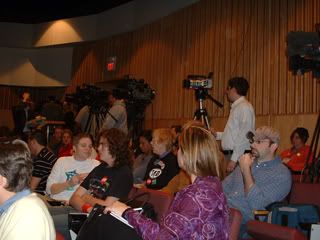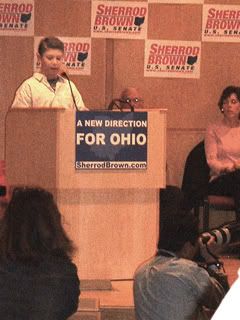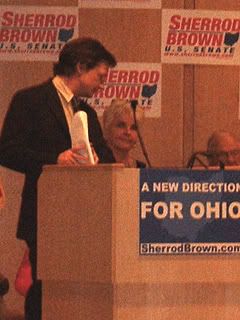 Demetrius and I first moved to Columbus (to attend graduate school) at around the time the 80s sitcom Family Ties was wrapping up its seven year run. I remember our new neighbors telling us that the show supposedly took place in Columbus, Ohio, and that local stores like Lazarus (now Macy's) made sure that the characters could be seen carrying shopping bags bearing their names and logos. That little factoid had slipped my mind until I read at Pho's Akron Pages that Michael would be coming to Columbus today for an event with Sherrod Brown. Thanks to my incredibly patient husband being willing to come with me (I *hate* trying to parallel park), I was not only able to attend the event, but this time I've actually got pictures. Actually, the reason I asked Demetrius to come along was because of the event's timing. When I first RSVP'd via Sherrod Brown's campaign site, it looked like the event would be from 11 to 12, so I was just planning to go to the event on my own once D came back from dropping Daughter in Ohio off at school. Then I got a reminder about the event saying that it was at 10 to 11, and it made a lot more sense to just go together after dropping Daughter off at school. We arrived at about quarter to 10 at the building housing Ohio State University's Moritz College of Law. We found a parking meter with a two hour time limit, but that seemed like it would be plenty of time. Nearly an hour and a half later, it was clear that it was *not* enough time, as Michael J. Fox and Sherrod Brown had not yet taken the stage. Demetrius had to run out to move the car and pump more money into the meter, thankfully getting back just as the program began. I was actually concerned that he might not be allowed back in, as the event was packed, with plenty of people who had been unable to find seats in the auditorium standing near the door. There were also bits of commotion from time to time as people in wheelchairs tried to get situated in the audience. Turns out there was a section in the back of the auditorium that was labeled as reserved seating for people with disabilities.  But camera from the news had set up there.  One of the women sitting behind us said that the law building had been constructed before current accessibility standards were put in place. Professor Colker, who is a specialist in disability law, had used money from an award she won to pay for that seating area, and that she'd be furious to see what happened today. There was also this guy wearing a shirt with the word REPUBLICAN in large letters on the front, who was clearly amused by the situation, and we wondered if and where he was planning to blog about it. Once the program finally got under way, it moved along very quickly. We heard first from Dr. Wendy Macklin about the need for new sources of stem cells for research. She explained that stem cells come from the inner cell mass of blastocysts which are about 150 cell embryos, generated in in vitro fertilization clinics. Of the many embryos generated in these clinics, some will result in pregnancies, but many won't. Those that are not used sit in liquid nitrogen for sometimes years. In the past, these have been used to generate cell lines. We can use cells that were generated as cell lines before August of 2001. Initially there were about 22 cell lines, and of those, only a small number are usable, and those have been grown on mouse feeder cells in a variety of ways. Those are not likely to be useful for tranplantation in any way. Dr. Macklin said that even though getting new lines of stem cells would be unlikely to lead to a cure for any given disease immediately, it would be a huge boon to this area of research. For just one example, it would allow us to investigate how to "tweak" cells in the nervous system in other parts of the body that have been degenerating from a particular disease. There were a number of people on the stage who were suffering from some type of disease or disability that could potentially benefit from stem cell research. Only one of them was scheduled to speak, but Sherrod Brown made a point of acknowledging the children by name. That was a nice gesture because, as tired as I had been getting of sitting and waiting for this event to begin, I could only imagine how restless the children were getting by the time things finally started.  After Wendy Macklin, we heard from Tanner Barton, an 11 year old boy from central Ohio talked about juvenile diabetes and how it affects his daily life. He's in 6th grade and is a competetive gymnast and swimmer. He went on to detail what is involved in constantly checking and maintaining the right blood sugar/insulin balance. The constant need for monitoring sometimes disrupted his practices and made him wary about sleeping away from home. He also related a recent experience that made him realize that he must be sure to get up early on days when he has an exam--so that he can have enough time between breakfast and exam time for his blood sugar to reach the optimal level.  Finally, it was Michael J. Fox's turn to take the stage. He started by saying that we need people like Sherrod Brown in Washington, so that science can reclaim its place in American society. It's part of what makes us great, along with our love and compassion for our citizens, and the desire to do the best thing for them. He thanked Tanner for sharing his experience with diabetes and said that it must be important for a guy his age to tell people what his life was like. Fox said, "Guess what? That doesn't change." At 45, you still want to share what your experience is like--it's a natural instinct. Michael congratulated Tanner on the beautiful job he did speaking about living with diabetes, adding, "I will use you as an inspiration." Michael said that "this is kind of a coming home for me in a weird way", because Columbus is the home of Alex P. Keaton from Family Ties. He commented that he was recently asked what his character (a conservative teen who admired Ronald Reagan) would think of him campaigning for stem cell research. Michael quipped, "First of all, he'd be happy I'm wearing a tie..." and added that he thinks Alex would say it's the right thing to do. Sherrod Brown voting for the stem cell research enhancement act--to expand federal funding of stem cell reasearch--was the right thing to do--but Mike DeWine voted against it. He said, "A vote for Sherrod Brown is a vote for hope of a better quality of life for millions of Americans." Michael noted, as he has recently on television, that he is supporting candidates who support all stem cell research (regardless of party) Limiting this research is short-sighted, and Michael said that he has every confidence that research will improve the lives of people suffering from numerous diseases. The majority of the House and the Senate, and over 70% of Americans supported expanding funding for stem cell research, but Mike DeWine sided with President Bush in voting against potentially life-saving research. Sherrod Brown will stand on the side of hope, supporting stem cell research in the Senate as he has in the House of Representatives. He went on to comment on the Limbaugh flap. "This past week I had a little run-in with some less-than-compassionate conservatives. I guess I'm not supposed to speak with you until my symptoms go away--or maybe I'm just supposed to go away." But he said that he's not going to go away, and neither are the millions of Americans and their families who live with debilitating diseases. We're going to make the diseases go away with the support of people like Sherrod Brown. Michael J. Fox: I'm asking you to stand up for America's continued leadership in health, science, and medicine, and what is right for the hundreds of millions of Americans who have or are touched by debilitating diseases. Bush and DeWine's policies have been a rejection of the promising future of medical science. "Well, forgive me for this, but it's time we 'get back to our future'!" This was greeted with laughter and applause for Michael, who received at least two standing ovations during his brief appearance on state. He ended by asking those in attendance to please vote for Sherrod Brown for Senate. It was a very moving experience to see Michael J. Fox speaking to a packed auditorium about this difficult issue. It also made me have some rather uncharitable thoughts about Rush Limbaugh needing a visit from the Karma Fairy. Heck, *I* don't want to be seen in public if I'm feeling under the weather and not happy with the way I look. I can scarcely imagine the courage it would take to appear on camera, on stage, while not having the level of control over my nervous system that most of us take for granted. Especially someone who has been in show business--I would think that makes one more image conscious than the average person. Michael J. Fox certainly *could* have chosen to live a private life with his family and friends, far from television cameras, not subjecting himself to the mockery and asinine speculations of the likes of Rush Limbaugh. There is no guarantee that expanded stem cell research would benefit him personally. I admire his courage in speaking out so publicly on this issue, and doubt I could ever be nearly that courageous myself, were I in his situation. I'm almost positive that Mr. Limbaugh couldn't. Alternate link for comments |
Monday, October 30, 2006
Alex P. Keaton returns to Columbus
Posted by
Renee in Ohio
at
2:07 PM
![]()
Subscribe to:
Comment Feed (RSS)


|